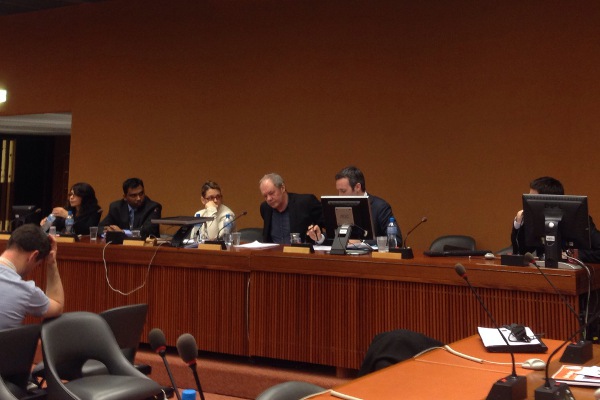 |
|
Picture: Tamil Guardian |
A side-event at the UN Human Rights Council in Geneva saw first-hand testimony from Dr Varatharajah Thurairajah, one of the doctors active in the No Fire Zone, in the last phase of the armed conflict.
The event, moderated by Julie de Rivero of Human Rights Watch, had Dr Varatharajah, the director of the No Fire Zone movie Callum Macrae, Edward Santow of the Public Interest Advocacy Centre and Charu Lata Hogg of Child Soldiers International.
Callum Macrae presented a short extract of the No Fire Zone movie, which included footage of Dr Varatharajah in the aftermath of attacks on hospitals in 2009.
Varatharajah detailed the incidents of government attacks on the hospital, which intensified once coordinates were passed to the government through the Red Cross. The doctor said that they were then scared to pass on GPS coordinates to the Red Cross as the shells landed very soon after the details were passed on.
He explained how the lack of medicine and blood bags caused many deaths, adding that the government deliberately understated the number of civilians in the conflict zone, in order to avoid sending adequate medical supplies, including anaesthetics.
Charu Lata Hogg said that it was very difficult to get accurate numbers of child casualties, but the 200 deaths between January and May 2009, as reported by the UN, were only the tip of the iceberg. She said children were forcibly recruited by the LTTE and the government-aligned Karuna faction. Hogg said there was documented evidence the Sri Lankan state aided and abetted child recruitment by Karuna and he should be held accountable for the crimes committed by his faction.
Edward Santow from the PIAC said that his organisation has been gathering some of most important evidence, collecting it and analysing it, to see whether there are reasons to suspect serious international crimes committed.
Santow said the alleged destruction of mass graves are important facts to consider and if the allegations are proven, a domestic inquiry cannot be an option, leaving an international accountability mechanism as the possibility.
Callum Macrae also said that an international investigation is crucial now, and that whatever mechanism is implemented, it cannot be a question of delaying justice for another year. He said that events are ongoing in the north now, like land grabs, sexual violence as a cultural weapon, and that there is sinister evidence of coercive contraception on Tamil women, while Sinhala families are being paid bonuses to have childred. Macrae said that there was a “dangerous and sinister project” ongoing and that the need for an international inquiry was not only a question of justice but an ongoing, urgent need.
